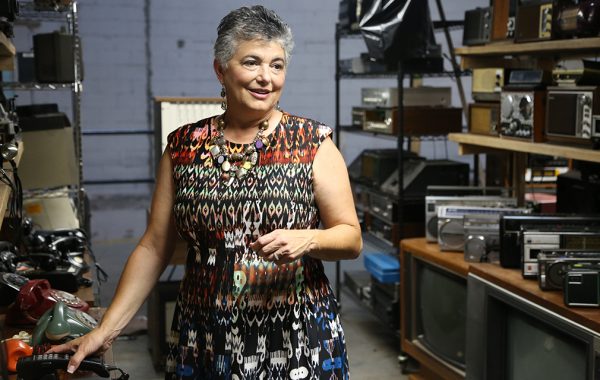
Gay Gordon-Byrne ’76, executive director of the Repair Association, a group that advocates for the right to repair and modify products. Photo by Jennifer Weiss, NBC News
We all know the drill by now. We turn on a new cell phone or other product, only to be greeted by a long list of “terms and conditions” that feels like we’re selling our life away. Most of us scroll through them to click “yes” without a second thought. Gay Gordon-Byrne ’76 used to do that, too, until she learned that she was agreeing not to repair her own product — or have anyone else repair it who isn’t authorized by the manufacturer.
“Once they have a chip installed, manufacturers wake up and say, I can protect my industry by claiming a copyright on the software,” Gordon-Byrne said. As executive director of The Repair Association, she’s fighting against some of the biggest companies in the world for the rights of the average repairperson to be able to fix products ranging from washing machines to farm tractors. “With a bit of research, we found it was completely legal to repair stuff around the copyright law,” she said. “Once you transfer something between buyer and seller, you can’t tell someone what to do with it.”
Gordon-Byrne learned the virtues of repair early. Growing up in a Boston suburb, her father designed computers — and repaired anything and everything. “Nothing in our house ever stayed broken,” she said. “He was always taking things apart with screwdrivers and putting them back together with wire and glue.”
As for Gordon-Byrne, she was a Colgate history major and music minor who performed in every music and theater show she could find. That later served her well as an advocate, giving her confidence in public speaking and the nerve to challenge large corporations. “The size of the crowd never intimidated me,” she said. “In fact, I found it energizing.”
After college, she followed in her father’s footsteps by selling computer software and eventually leasing hardware systems for 30 years. Starting in 2010, however, she saw an increasing number of computer companies, including Oracle, IBM, and HP, start to outlaw any independent repairs on their systems, decimating the business of many of her colleagues. Gordon-Byrne, who was by then retiring from her company, volunteered to lead the fight against such practices. “I was the only one who could throw rocks and not get burned,” she said.
Despite her lack of political background, she thrived in the role. “It suits my personality,” Gordon-Byrne said. In her mind, attempts by companies to put the kibosh on indie repairs comes down to one thing: greed. By monopolizing repairs, companies can set prices to be whatever they want, “or even make repairs so expensive that you have to buy a new one,” she said.
In 2012, after automobile manufacturers started inserting chips into cars, Massachusetts passed a “right to repair” law to allow repairs by independent garages. Now those garages routinely charge 30 percent less than dealerships. Gordon-Byrne is working to pass similar laws in state legislatures that would apply to any consumer product. Despite headway in several states, she said, her organization has so far been thwarted by corporate lobbyists who have delayed action. “It’s very popular with constituents, but these high-priced lobbyists come in and sow enough doubt that lawmakers say, ‘let’s do it next year.’”
Still, she’s hopeful that Massachusetts will be the first state to pass a law this fall. And if not, New York, Nebraska, and Wyoming aren’t far behind. Once one of them passes a law, explained Gordon-Bryne, manufacturers will have no choice but to change practices across the board. “Info and parts and tools have a tendency to cross borders,” she said.
Until then, Gordon-Byrne’s plucky perseverance continues to raise the profile on the issue; in the past year, she has been interviewed by NBC News, Forbes, and WIRED, and named a “Human of the Year” by VICE magazine, which called her the “ringleader of the ‘right to repair’ movement.” For her part, Gordon-Byrne clearly relishes her new role as corporate gadfly. “It affects so many people who can’t afford repairs or to buy a new product,” she said. “I can contribute and use some of my experience to right some of these wrongs.”
— Michael Blanding






